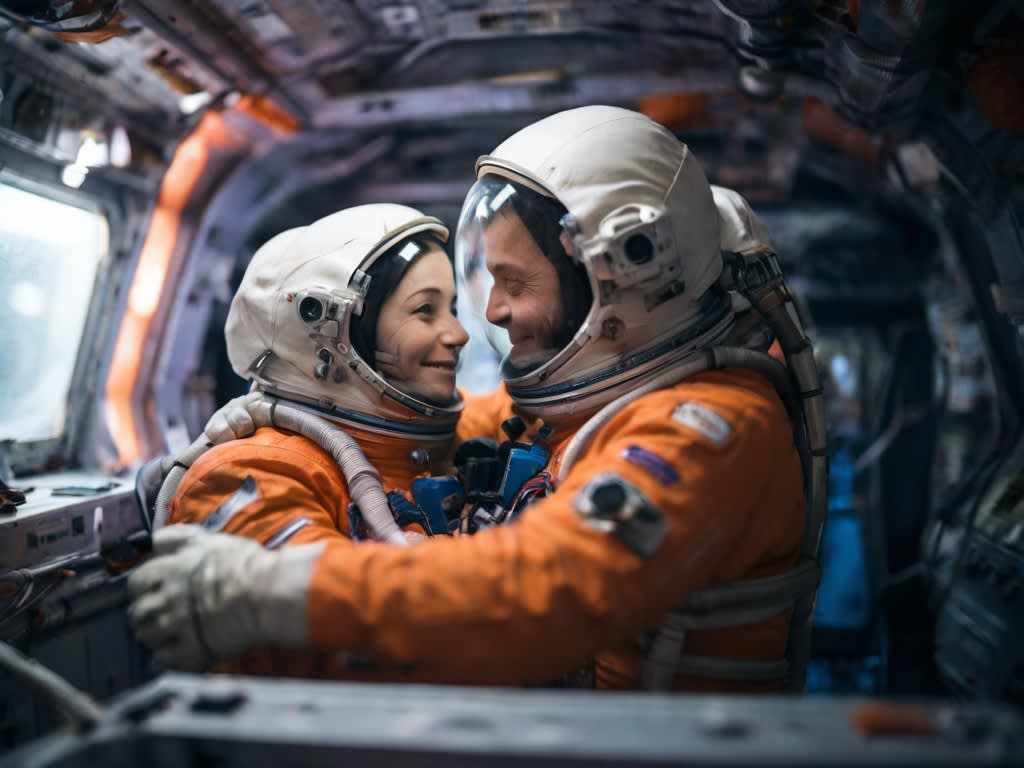
The idea of having sex in space might seem like a far-fetched fantasy, but it's a topic that has piqued the interest of scientists and the general public alike. With the advent of space tourism and the need to study human sexual activity in space for human health and happiness, it's not as impossible as it used to be. Let's dive into the challenges and potential benefits of having sex in space!
Challenges of Having Sex in Space
1. Microgravity: The weightlessness of outer space poses a significant challenge for humans trying to engage in sexual activity. According to Newton's third law, if the couple remains attached, their movements will counter each other, and their actions will not change their velocity unless they are affected by another, unattached object. This makes the logistical possibility of having sex in space rather tricky.
2. Physical Contact: While there is no scientific evidence to confirm the difficulties of having sex in space, weightlessness could create some awkward challenges. Doctors generally believe it's possible, but the lack of gravity might make certain positions or movements uncomfortable or impossible.
3. Radiation and Stress: Aspects of space, like radiation and changes in gravity, could make sex and reproduction very challenging for people. Additionally, there's the stress of living in an isolated, confined environment.
4. Lack of Research: There is a lack of research on humans in space, which could be due to conservative sexual norms or other factors. However, as space tourism becomes more popular, this lack of research could change, and studying human sexual activity in space might become a priority.
Potential Benefits of Space Sexology
While having sex in space might seem like a frivolous topic, there are potential benefits to studying human sexual activity in space. Some potential benefits of studying and understanding human sexual activity in space, also known as "space sexology" or "astrosexology," include:
Human Health and Happiness: Researchers argue that studying sex in space is critical for human health and happiness . Understanding how humans behave sexually in weightless conditions could provide valuable insights into human eroticism and contribute to the development of a healthier and happier society .
Space Tourism and Settlement: As space tourism becomes more accessible and the prospect of colonizing low-Earth orbit and beyond grows, the study of space sexology becomes increasingly relevant. It is essential to consider the basic human function of sex and reproduction to ensure the well-being of space travelers and potential future settlers .
Relationship Dynamics: Research suggests that having married couples on long-duration missions in space analog environments tends to temper sexual competition and can be very beneficial in high-stress situations . Understanding how sex impacts small-group dynamics in isolation is a crucial component to its study, especially in the context of long-term space missions and potential space settlements .
Technology and Solutions: The study of space sexology could lead to the development of technology and solutions to address the intimate and sexual needs of humans in space. This could include the development of equipment, artificial gravity systems, and other technological innovations to facilitate sexual activity and intimacy in space .
The Future of Space Sexology
As space tourism continues to grow, the possibility of having sex in space becomes more plausible. Commercial spaceflights, orbital stations, and space hotels are all part of the rapidly evolving space industry. With the advent of space tourism, the study of human sexual activity in space, also known as "space sexology" or "astrosexology," could become a critical aspect of space exploration.
In conclusion, while having sex in space might seem like a far-fetched idea, it's a topic that is becoming increasingly relevant as space exploration and tourism become more accessible. Understanding human sexual activity in weightless conditions could provide valuable insights into human eroticism and contribute to the development of a healthier and happier society. So, the next time you gaze up at the stars, remember that the future of space sexology is just around the corner!





Comments
There are no comments for this story
Be the first to respond and start the conversation.